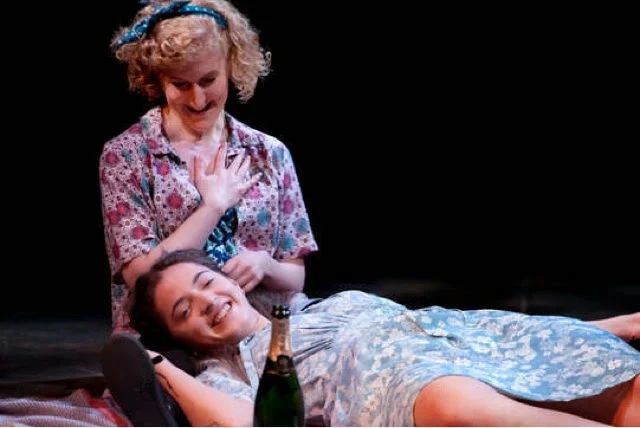It’s difficult to write about The Two Gentlemen of Verona (currently on at the Royal Shakespeare Theatre until 4 September – far too short a run for a play that’s not been on the RSC’s main stage for 45 years; and is actually rollickingly good – but more of that, anon…!) without smashing into scholars discussing its date of origin; crossing swords with critics cogitating about the quality of writing and plotting; encountering Shakespeare enthusiasts wondering why there are nearly always only two or three talking characters on the stage at any one time (and often explaining in detail what is happening – in “exposture” – rather than letting the storylines emerge, as in later works); and why there aren’t others of his plays featuring a scene-stealing dog:
You see – comedy. Love, and a bit with a dog. That’s what they want.
In a way, that sums the play up pretty well! However, it wouldn’t be Will, if it didn’t occasionally plunge into real depths of emotion, periodic despair and tragedy. (Even in the great comedies, such as As You Like It – and what a wonderful production that was, last year: so good, indeed, that I saw it thrice…! – there are moments of heartbreaking sadness; with my hero Jaques providing a melodic thread of melancholy, throughout.)
The cast is uniformly excellent; and, yes, Mossup, cross-dressing as Crab the dog, receives repeated ahs and applause for her paw-fect timing (and even one word of dialogue)! But we mustn’t forget the humans – the young principals all subtly developing and learning, as the play moves on.
My particular favourite was Pearl Chanda as Julia (a full dress-rehearsal for Shakespeare’s future girls-dressed-as-boys; and a definite precursor to Rosalind) – perhaps because she, most of all, travels across an emotionally-challenging arc towards the somewhat subdued conclusion: emerging more mature from her travails. Nicholas Gerard-Martin is an excellent foil to Mark Arends’ Proteus; and his rendition of Who is Silvia? is one of the evening’s highlights.
As seems all the rage at the moment, at the RSC, the action begins before the audience arrives: although I missed out on the free gelato being handed out to select attendees invited into Antonio’s Veronese trattoria – the on-stage musicians were highly entertaining, though; and the score supports the action perfectly and appositely throughout.
As is also a current trend, some of the action takes place on an evolving balcony, high above the stage: lending a more commanding presence to certain characters, and differentiating them from – raising them above – the others.
Altogether, a highly entertaining evening – and a full house! Although Shakespeare’s dramatical skills don’t appear fully developed, here, they are still significant, and more than worthy of exploration – just not quite as subtle or with that constant touch of genius that would become his trademark. (Compare early Beethoven piano sonatas with the later ones, and they appear immature. However, they still have a ‘specialness’ beyond that of many of his contemporaries: demonstrating obvious signs of what was to come. I think the same came be said of this play….) Just a shame that there won’t be that many performances.




No comments:
Post a Comment